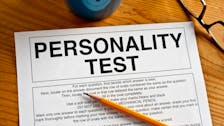Personality Tests (2025 Guide)
All products and services featured are independently selected by WikiJob. When you register or purchase through links on this page, we may earn a commission.
- What Are Personality Tests?
- Why Do Employers Use Personality Tests in 2025?
- Can I Practice a Personality Assessment for the Job I Am Applying For?
- Ipsative Personality Questionnaires
empty
empty
- Normative Personality Questionnaires
empty
empty
- Potential Problems With Personality Tests
- Myers-Briggs: The 16 Personality Types
empty
empty
- Frequently Asked Questions
What Are Personality Tests?
The personality test and the personality questionnaire are used to determine a candidate's typical reactions and attitudes to various situations.
These tests might try to identify how well you get on with others, your normal reaction to stressful situations, or your feelings about the kind of people you like to work with.
Employers look at many factors during the recruitment process, from your knowledge and experience through to your aptitude in areas such as decision making and teamwork.
Increasingly, they will typically use a personality assessment for the job role you're appling for as a way to determine if you have the right attitude and personality to fit in with the company’s culture and vision.
Myers Briggs is one of the most commonly used personality tests.
After progressing through a series of questions, you will be assigned to one of sixteen personality types based on your responses. Employers then review this personality type to see if you would fit in with their organisational values.
Why Do Employers Use Personality Tests in 2025?
Employers may scrutinise your personality for these reasons:
First, they may want to determine whether you have the motivation and enthusiasm that they require.
Second, they may want to assess how effectively you will fit in with their team, as well as your attitude and approach to work in general.
Many businesses believe the personalities of individual employees directly impact the success of the business. If a manager cannot sufficiently motivate their staff or the team does not work cohesively, team productivity and overall service quality could suffer.
In the past two decades, there have been significant changes in the way businesses operate.
Increasingly, business culture has focused on the customer, and employees have much more freedom and input than they once did. As such, businesses need employees who are willing to change their way of working or communicate with many different colleagues and customers on a daily basis.
These factors are impacted by your personality, which is why employers are looking more and more at personality tests to determine a candidate’s suitability.
A personality assessment for job application allows an employer to evaluate how well you can handle an array of work-based activities such as working in a team, solving problems, leading others, managing stakeholders and coping with stress.
Someone in a customer service or sales role, for example, may benefit from a very different personality type than someone recruited into a data analysis or technical role.
Employers are genuinely interested in your personality, and how you will fit the existing team.
Can I Practice a Personality Assessment for the Job I Am Applying For?
Although a personality test is structured very differently to other psychometric tests, you can still practice for them.
The best preparation that you can do is to research the job that you are applying for and carefully review the job description, requirements and person specification. These will give you clues as to the type of personality that the recruiter is looking for.
Once you have understood the job properly, you then need to demonstrate to the recruiter that you possess the relevant traits required. A personality test for jobs is used to assess candidates and can vary; eg some measure your behavioural style or personality. Consequently, it is important to understand what your personality test measures and what traits are important to your potential employer.
There are various websites that you can visit to familiarise yourself with the type of questions you may be asked during the personality test. Practice tests give you more time to really think about your answers. They are typically developed in collaboration with employers and psychologists.
Online personality tests can help you evaluate specific traits such as leadership, teamwork, ability to work under pressure and so on.
The practice tests are designed to help you learn about your personality traits and how they are both advantageous and disadvantageous. If you are applying for a digital role, your personality profile would ideally include traits such as creative thinking, collaboration and the acceptance of new ideas.
If you’re looking to practise personality tests prior to a job application, you can try these test packages compiled by JobTestPrep. There are 250 questions and over 10,000 people have used them to date.
Ipsative Personality Questionnaires
An ipsative personality questionnaire, sometimes known as a forced-choice scale questionnaire, is the most commonly used personality questionnaire.
A ‘traditional’ personality questionnaire might request that the candidate rates their agreement with a particular statement on a scale of 1 to 5, whereas an ipsative test will provide the candidate with a choice of between 2 and 4 statements, for which they must provide their preference or state which one they agree with the most.
This demands more thought on behalf of the person completing the personality test because there is not an obvious choice to pick from.
Benefits of Ipsative Questionnaires
Ipsative personality questionnaires are considered a reliable indicator f personality traits and are better at avoiding social desirability bias than other test types.
They can also benefit candidates since employers have to actually go through and read each answer.
Drawbacks of Ipsative Questionnaires
One of the major drawbacks of this type of questionnaire is that it does not provide a comparative sample of ‘normal’ personality traits.
As such it may take employers a considerable amount of time to progress through each answer for every candidate.
Normative Personality Questionnaires
If a test does not provide ipsative questions, it will take a normative approach.
These types of questions are typically used during psychometric testing, because they can explore the personality traits of candidates, which can then be compared with others who have taken the same test.
This allows personality to become measurable, which is easier to evaluate when reviewing large numbers of potential candidates.
Normative-based personality questions will include a ‘likert type scale’, whereby the candidate will rank how strongly they agree with a given statement, usually on a scale of 1 to 5, with 1 being in strong agreement and 5 strong disagreement.
Benefits of Normative Questionnaires
With this type of personality assessment for job applications, it is impossible for individuals to deviate from what is being asked. As such it is an effective way of both collecting and comparing answers.
Employers can also create a list of ‘normal’ or ‘ideal’ characteristics that they would like a potential candidate to display.
Drawbacks of Normative Questionnaires
This type of questioning often creates problems. Perhaps the main problem is that the process of questioning can soon become monotonous, and candidates may just randomly select any answer to get through the test.
The second issue arises when the candidate tries to give the answers that they think the employer wants to see, rather than what they actually feel.
There’s a risk that if an employer relies on a normative test alone, they may recruit a candidate that they thought would be ideal, when in reality the candidate is very different.
Usually it’s best for employers to combine both types of questionnaire, to enable employers to take a closer look at candidate responses. With a combination of both approaches, an employer can better identify consistency and questions are answered more honestly, resulting in a more accurate picture of the candidate.
Potential Problems With Personality Tests
Making the wrong decision when it comes to recruiting can be costly for a business. Some employers have turned to personality tests to better understand the people that they are recruiting - yet others are questioning whether they can really be a true measure of a candidate’s suitability.
There are multiple problems associated with personality tests for jobs as a recruitment tool, including:
-
Screening out great candidates. The whole idea behind the personality test for job applications is to determine whether someone’s personality fits in with a particular role or not. Although this may work perfectly well with some professions, it won’t work for all. In addition, the tests may portray those with a ‘normal’ personality type as being more positive, while more eccentric creative types with great potential could be eliminated from the recruitment process early on.
-
Flawed Results. With a personality test for jobs, there is always the chance that a candidate won’t answer the questions truthfully or will select the answer that they think is the most suitable. Consequently the test result won’t be an accurate representation of their personality. Additionally, many of the personality tests such as Myers Briggs were not designed for recruitment; its purpose was primarily for employee development and training.
-
Privacy and Discrimination. These personality tests open up a minefield for discrimination and privacy issues. Some people argue that they are simply not suitable to be used as a recruitment tool. The questions that candidates are expected to answer may be quite personal and the significance of their answers ambiguous, which may provide information about the individual that they would rather keep private. Some argue that if employers do use these tests as part of the recruitment process, candidates should be given the option to opt-out.
If you’re looking to practise personality tests prior to a job application, you can try these test packages compiled by JobTestPrep. There are 250 questions and over 10,000 people have used them to date.
Myers-Briggs: The 16 Personality Types
The Myers-Briggs assessment test (also known as the Myers-Briggs Type Indicator or MBTI) is a psychometric questionnaire designed to define personality types and measure psychological preferences in people.
The Myers-Briggs test derives most of its underpinning theory from Carl Jung's Psychological Types ideas and, to a lesser extent, the Four Temperaments (or Four Humours).
The test was developed by Isabel Briggs Myers working with her mother Katharine Briggs during the Second World War as a mechanism to help place women in appropriate employment at a time when many men were fighting abroad.
The test essentially developed Carl Jung's theories into a usable methodology and system for understanding and assessing personality.
According to the Myers Briggs Foundation, more than two million people are assessed using the MBTI personal inventory instrument globally every year.
The Purpose of Myers-Briggs
The Myers Briggs Type Indicator model is a method for understanding personality and preferred modes of behaving.
It is not a measurement of intelligence, competence, emotional state, mental stability or maturity, and must be used with great care in assessing aptitude for jobs or careers: people can do most jobs in a variety of ways, and the MBTI gives little or no indication of commitment, determination, passion, experience or ambition.
In most respects, psychometrics tests and personality models are aids to personal development and to helping people understand more about themselves. They should not be used alone for recruitment or career decisions.
Once candidates have completed the personality test, they will be assigned to one of 16 personality types, which we’ll explore in detail now.
The 16 Personality Types
1. INFP
INFPs are imaginative and guided by their own beliefs and values. Identifying possibilities is something of great importance to them, and people with this trait will always see the potential for an improved future.
INFPs are caring, compassionate and sensitive, as well as being interested in personal development and growth. They enjoy spending time exploring their own values and ideas, and they subtly encourage others to do so. Creative and artistic, INFPs are always looking for new ways to express themselves.
Key Strengths:
- Concerned about other people’s well-being
- Sensitive to the feelings of others
- Demonstrates long-term commitment and loyalty
- Driven with a commitment to meeting the expectations of others
- Always aims to achieve positive and amicable solutions
- Encouraging, supportive and nurturing
- Easily recognises other people’s need for space
- Can express themselves effectively
Potential Weaknesses:
- May be shy or sometimes reserved
- Very protective of personal space
- Often avoids criticism and conflict
- Frequently searches for credit and praise
- Can react emotionally in situations where there is a lot of pressure
- Avoids punishing others
- May take a longer period of time to share feelings
- Perfectionist tendencies, which can result in a lack of self-credit
- Capacity for self-blame
What Careers Might Suit an INFP?
Within a working environment, INFPs are not driven by status or money, opting for work that aligns with their personal values and enables them to help others. Motivated by inspiration and vision, they engage in projects and causes which are important to them.
They enjoy creative problem-solving and they take time to understand complex issues. The ideal job for an INFP would be one where they can express their individuality and one that allows them to make the most of their ability to identify unique solutions.
- Physical Therapist
- Writer/Author
- Librarian
- Painter
- Graphic Designer
For more on INFP careers, see our article on the 10 best career matches for INFP personalities.
Practice Personality Test with JobTestPrep
2. INTJ
An INTJ will demonstrate good problem-solving skills and the commitment to continually improve processes and systems using new ideas.
With a natural aptitude for seeing possibilities to improve situations, they enjoy logical reasoning and complex problem solving.
INTJs are intellectual and they approach life by analysing people and situations. Drawn to logical systems, they are much less comfortable with situations that are unpredictable.
Key Strengths:
- Not phased by confrontation or criticism
- Self-confident
- Intelligent, with a lot of potential
- An effective listener
Potential Weaknesses:
- Can be thought of as insensitive, not in tune with others’ feelings
- Responds to conflict with reason and logic, lacks emotional involvement
- Difficulty expressing emotions or feelings
- Strong belief in their personal opinions
- Cannot accept blame
What Careers Might Suit an INTJ?
Those with an INTJ personality will excel in the implementation of creative solutions. They have a natural aptitude for seeing the potential for improvement within a complex system or situation, and they are focused and determined to implement their ideas for change.
INTJs will prefer working within a small team or independently taking strategic steps to bring about change. They enjoy understanding complex theories and concepts and want to understand how they can improve ways of working, systems and processes.
- Dentist
- Lawyer
- Judge
- Research Scientist
- Mathematician
- Chemical, Biomedical or Mechanical Engineer
- Teacher or Lecturer
For more on INTJ careers, see our article on the 10 best career matches for INTJ personalities.
3. ESFJ
Individuals with this personality will be sensitive to the needs of others and are always willing to help.
They are extremely dedicated to fulfilling their responsibilities and are receptive to both the feelings of others and perceptions that others have of them.
They will make a great deal of effort to address the concerns of others and to bring order to their lives.
Key Strengths:
- Dedicated to fulfilling their obligations and duties
- Has a friendly and supportive demeanour
- Service-orientated
- Dependable, practical and responsible
Potential Weaknesses:
- Finds change difficult
- Avoids criticism and conflict
- Requires ongoing positive support to feel good about themselves
- Often uses guilt to manipulate others to get their own way
What Careers Might Suit an ESFJ?
An ESFJ in the workplace will use their interpersonal skills to coordinate both processes and people. They take great satisfaction from completing tasks with precision and in an orderly manner.
ESFJs like to work with others and they thrive in action-focused teams. Their ideal work environment would be one where expectations are clear, and there is a friendly and structured atmosphere in which to work.
- Operations Manager
- Human Resources Manager
- Nurse or Nursing Instructor
- Special Education Teacher
- Guidance Counsellor
- Mental Health Counsellor
- Receptionist
For more on ESFJ careers, see our article on the 10 best career matches for ESFJ personalities.
4. ESTJ
Eager to take charge in any project or activity that involves the organisation of people, ESTJs are hardworking, orderly and conscientious.
They adopt a methodical approach to projects and they want to structure their surroundings.
When they see lack of order, they are the first to take the initiative to develop new systems and processes so everyone has clear ideas of what is expected.
Key Strengths:
- Very approachable, friendly and energetic
- Responsible and dependable, with a strong commitment to fulfilling obligations
- Does not feel threatened by criticism or conflict
- Prefers to resolve a conflict rather than ignore it
Potential Weaknesses:
- Often has a need to be in charge
- Impatient with inefficiency or mistakes
- Not in sync with what others are feeling
- Has difficulty expressing their feelings
- Uncomfortable with change
What Careers Might Suit an ESTJ?
An ESTJ is great at organizing operations, people and projects, but they do like to be in control. People with this personality often pursue managerial roles, where they can oversee decisions and make policies.
ESTJs often develop a strong reputation in the workplace for delivering what they promise; they are extremely reliable and thrive in taking projects through to completion. As they are often eager to take on more responsibilities, they are sometimes overworked.
- Engineering Manager
- Financial manager
- Judge
- Financial Analyst
- Judge
- Accountant/auditor
- Teacher
For more on ESTJ careers, see our article on the 10 best career matches for ESTJ personalities.
5. ESFP
An ESFP is an entertainer who can engage people. Often spontaneous and fun-loving, they are approachable, warm and talkative, with an enthusiasm for life. They often like to be the centre of attention and they have a playful sense of humour.
Key Strengths:
- Clever, likeable and popular
- Fun-loving and enthusiastic
- Level-headed, responsible and practical
- Flexible and easy-going
Potential Weaknesses:
- Sensitive to criticism
- Takes the easy way out of a conflict rather than facing it head-on
- Excited about change but struggles with long-term commitment
What Careers Might Suit an ESFP?
An ESFP in the workplace has a need to be the centre of attention and they much prefer an active, social environment. Realistic, pragmatic and with an artistic streak, this type of person would thrive in a role that allows them to serve other people and where they can see real results.
Strict rules or bureaucracy are difficult for ESFPs, since they like the freedom to address situations as and when they arise.
- Fashion Designer
- Painter
- Sports Coach
- Childcare Worker
- Actor
- Musician
- Singer
For more on ESFP careers, see our article on the 10 best career matches for ESFP personalities.
If you need to prepare for a number of different employment tests and want to outsmart the competition, choose a Premium Membership from JobTestPrep.
You will get access to three PrepPacks of your choice, from a database that covers all the major test providers and employers and tailored profession packs.
6. ISFJ
Traditional, organised and practical, an ISFJ is highly motivated to provide for others. They are grounded, conventional and enjoy contributing to established structures.
As an employee, an ISFJ is committed and displays a sense of responsibility to others. With a key focus on taking care of other people’s needs, they want others to know that they are reliable and trustworthy.
Key Strengths:
- Supportive and friendly
- Great listener
- Possesses the drive to fulfil obligations and duties
- Very organised
Potential Weaknesses:
- Finds it difficult to try new things
- Avoids criticism and/or conflict at all costs
What Careers Might Suit an ISFJ?
In the workplace, an ISFJ is motivated through their requirement to help others. They are driven by personal values and they enjoy work which requires established procedures and attention to detail.
An ISFJ would much prefer to work in the background and receive recognition in a subtle way, without having to present their work to others. They do not like the spotlight.
- Operations Manager
- Accountant/Auditor
- Nurse
- Teacher
- Paralegal
- Childcare worker
For more on ISFJ careers, see our article on the 10 best career matches for ISFJ personalities.
7. ISFP
An ISFP personality is both unassuming and quiet, and may be difficult to get to know. Those who know ISFPs realise that they are friendly, warm and eager to share life’s many experiences.
With a natural talent for the arts, ISFPs have a strong aesthetic sense and they excel in the use of creative tools, demonstrating natural creative flair.
Key Strengths:
- Optimistic, supportive and friendly
- Effective at responding to and dealing with everyday obligations
- Relaxed, flexible and willing to compromise
- Great at listening
Potential Weaknesses:
- May struggle with long-term planning
- Often avoids conflict and criticism
- Sometimes lazy or slow to progress
- Tendency to be negative at times
What Careers Might Suit an ISFP?
An ISFP will want to engage with their work and embark on a career which allows them to express themselves. They enjoy hands-on activities where they can see the results of their efforts.
ISFPs prefer a cooperative, courteous work environment where they can progress in calm surroundings seeking the required support when they need it. An ISFP would prefer to keep a low profile, so would probably avoid roles that require them to speak to large groups or in public presentations. They do prefer to work autonomously but require their colleagues to be flexible, loyal and supportive.
- Paediatrician
- Vet
- Nurse
- Teacher
- Painter
- Chef or Head Cook
- Conservation Worker
- Musician or singer
For more on ISFP careers, see our article on the 10 best career matches for ISFP personalities.
8. ESTP
An ESTP is vibrant, lively and at their best in the thick of the action. They bring a sense of energy and enthusiasm to all of their projects, and they can quickly assess situations to address immediate issues with a practical solution. ESTPs appear social and are rarely sensitive, preferring to keep things moving - as such they tend to excel within a fast-paced environment.
Key Strengths:
- Popular, witty and clever
- No threat from criticism or conflict
- Remains calm and collected in emergencies
Potential Weaknesses:
- Often unaware of what others are feeling
- May find it difficult to express feelings or emotions
- Sometimes unknowingly hurts another’s feelings through what they say
- Poor at long-term planning
- Inclined to ignore problems rather than resolving them
What Careers Might Suit an ESTP?
Within a work environment, an ESTP is effective when it comes to solving logical problems. They have a good grasp of reality and they understand what resources they have available that can solve a problem or concern.
An ESTP likes to know how things work, so is best suited to mechanical roles or a job which is unpredictable and presents adventure and challenge on a daily basis.
- Marketing Manager
- Network Administrator
- Criminal Investigator
- Market Research Analyst
- Advertising Sales Agent
- Paramedic
9. ISTJ
An ISTJ likes to be organised and takes pride in creating a sense of order in both institutions and systems. They are neat and precise, and develop a procedure for everything. Dutiful and extremely reliable, they want to follow regulation and uphold tradition.
ISTJs tend to be steady and productive: they know where they belong and understand how they can contribute to systems and organisations. They pride themselves in making sure that standards are met.
Key Strengths:
- Honours commitments
- Very precise at communicating exactly what is on their mind
- Very good listening skills
- Receptive to criticism
- Handles situations that involve conflict without losing control
Potential Weaknesses:
- Strong belief in their personal opinions
- Drawn to conversations of a competitive nature
- Out of tune with the feelings of others
- Values rigid structures
What Careers Might Suit an ISTJ?
ISTJs thrive in a career that requires them to be meticulous and dependable. They are most suited to systematic processes and they value stability within the work environment. Although they do like to work predominantly alone, they often appreciate the value of teamwork.
The ideal job for an ISTJ personality is one that allows them to use their logical thinking skills to solve problems in an orderly fashion.
ISTJ Careers:
- Dentist
- Lawyer
- Computer programmer
- Accountant or Auditor
- Librarian
For more on ISTJ careers, see our article on the 10 best career matches for ISTJ personalities.
10. ISTP
An ISTP demonstrates a strong interest in troubleshooting and mechanical systems. They approach their work with the idea of finding practical solutions to problems. Attentive to detail, they are effective at responding quickly and enjoy taking action. An ISTP likes to apply logic and seeks out practical solutions.
Key Strengths:
- Usually self-confident
- Optimistic and likeable
- Responds to daily concerns in a realistic and practical manner
Potential Weaknesses:
- Struggles to make long-term plans
- Can be seen as insensitive
- Thrives in environments which are exciting and active
What Careers Might Suit an ISTP?
An ISTP is best suited to a technical role where they can make the most of their technical expertise. They enjoy using tools of their trade, whether this is in a practical setting or the digital world.
ISTP personalities prefer an occupation that provides a measurable result, as they take great satisfaction from seeing what they have built. The majority of occupations suited to an ISTP character would involve something physical and perhaps an element of danger. ISTPs hate being behind a desk. They prefer roles which are practical, without being tied down with rules or complex procedures.
- Airline Pilot
- Research Scientist
- Chemical/Biomedical Engineer
- Forensic Science Technician
For more on ISTP careers, see our article on the 10 best career matches for ISTP personalities.
11. INFJ
Creative with a strong sense of integrity, an INFJ possesses the drive to help others reach their full potential. They are dedicated to their work, with a natural aptitude for helping others to overcome personal challenges. The INFJ has a natural skill for interpreting the motivations and emotions of others, and they are able to read people very well.
Key Strengths:
- Displays a supportive and friendly nature
- Always attempts to please others
- Feels an obligation to fulfil their duties
- Organised and efficient when dealing with practical issues
Potential Weaknesses:
- Due to caring nature, can neglect own requirements
- May find it difficult to explore new things
- Strongly avoids any conflict or criticism
What Careers Might Suit an INFJ?
INFJ personalities are very interested in helping others and they are dedicated, principled and helpful when it comes to their work. They thrive in environments where they can turn their ideas into one that creates positive change for others.
Very organised, INFJs prefer to complete projects in an orderly fashion. Their ideal career is one that allows them to use their creativity in an organised and independent environment.
- Writer
- Librarian
- Counsellor
- Painter
- Photographer
- Musician
- Actor
For more on INFJ careers, see our article on the 10 best career matches for INFJ personalities.
12. ENTJ
An ENTJ is driven and motivated to bring about change. They are quick to identify inefficiencies and are constantly developing new solutions to achieve their vision. They are usually quick-witted and articulate, as well as being objective and analytical.
When there are problems with a system, the ENTJ will enjoy the process of unpicking them to identify a solution. They thrive in leadership roles, enjoying the responsibility of organizing people and processes.
Key Strengths:
- Genuinely interested in the ideas and thoughts of others
- Moral and fair
- Direct and straightforward
- Focused on the development of their knowledge
- Takes positive lessons from conflict
Potential Weaknesses:
- Can appear argumentative due to their interest in debate
- Naturally challenging and confrontational
- Can be critical of others who have different opinions to their own
What Careers Might Suit an ENTJ?
An ENTJ personality would be drawn to leadership positions that allow them to develop strategies to bring about greater order and improved productivity. They prefer supervisory or managerial roles, and they want the ability to coordinate organisational change.
An ENTJ would enjoy the challenges associated with solving complex problems, so they can identify what improvements are necessary. They value structure and guidelines, and they appreciate businesses which are fair.
- Chief Executive
- Lawyer
- Financial Analyst
- Human Resources Manager
- Political Scientist
- Software Developer
- Management Analyst
For more on ENTJ careers, see our article on the 10 best career matches for ENTJ personalities.
13. ENTP
Naturally innovative, ENTPs are motivated by the need to find new solutions. They enjoy an intellectual challenge and are both clever and curious, with a strong interest in understanding systems, principles and people. ENTPs like to challenge others, yet are very rarely judgemental themselves.
Key Strengths:
- Popular, energetic and enthusiastic
- Excellent communicator
- Very focused on self-improvement
- Flexible and easy-going
Potential Weaknesses:
- Always enthusiastic about anything new
- Often fails to follow through on ideas or plans
- Can be argumentative
What Careers Might Suit an ENTP?
ENTPs seek careers where they can use their skills in innovation to address a challenging problem, or to improve the efficiency of a system or process. They are often entrepreneurial and prefer to approach projects in an unstructured and casual manner.
An ENTP will value competency, and they often want to be an expert - so they enjoy a career that requires them to continuously develop their skills and knowledge. The ideal environment for an ENTP is one that allows them to use their creativity to devise and implement creative ideas.
- Psychiatrist
- Lawyer
- Aerospace Engineer
- Nuclear Engineer
- Electrical Engineer
- Materials Scientist
- Reporter
For more on ENTP careers, see our article on the 10 best career matches for ENTP personalities.
14. ENFJ
ENFJs are effective organizers driven to implement what they think is best for everyone. They often facilitate growth because they see the potential in everyone, and they are both forward-thinking and optimistic.
Very focused on vision and values, ENFJs often have a lot going on and are always on the lookout for improvement opportunities.
Key Strengths:
- Strong verbal communication skills
- Excellent perception of the thoughts and motivations of others
- Inspires and motivates others to bring out the best in them
- Driven and dedicated to meet the expectations of other people
Potential Weaknesses:
- Can be manipulative and controlling
- Critical of opinions and attitudes if they differ from their own
- Sensitive to conflict; often covers up problems rather than dealing with them
- Blames themselves when things go wrong
What Careers Might Suit an ENFJ?
An ENFJ is enthusiastic, particularly when it comes to motivating and advising others. They are often found in a mentoring or coaching role, with the ultimate goal of helping others become better at what they do.
ENFJs are often found in a leadership position because of their natural aptitude for organizing people. They possess vision and creativity to develop innovative solutions. ENFJs value teamwork and they want to have the resources to make their ideas a reality.
A suitable work environment would be one that is focused on people with a clear humanitarian element, or an emphasis on constructive action.
- Sales Manager
- Operations Manager
- HR Manager
- Teacher
For more on ENFJ careers, see our article on the 10 best career matches for ENFJ personalities.
15. INTP
Fascinated by design, logical analysis and systems, an INTP is preoccupied with theoretical elements and wants to understand the complexities of everything. An analytical observer, they can at times seem oblivious to the world around them because they are so focused on their thoughts. They spend a great deal of time making connections, understanding concepts and finding out how and why things work.
Key Strengths:
- Relaxed, easy-going and willing to compromise
- Tends to approach things with enthusiasm
- Creative, imaginative and artistic
Potential Weaknesses:
- Sometimes out of tune with other people’s feelings
- Can tend to display suspicion and doubt about others
- Struggles with practical tasks
What Careers Might Suit an INTP?
The perfect career for an INTP is one that involves the analysis of complex ideas and systems to develop a deep understanding of how they work. INTPs would rather develop their own path and lack interest in tradition; they follow theoretical ideas rather than practical systems.
- Pharmacist
- Physicist
- Mathematician
- Computer Programmer
- Chemist
- Forensic Scientist
For more on INTP careers, see our article on the 10 best career matches for INTP personalities.
16. ENFP
ENFP personalities are very people-focused and have a genuine enthusiasm for new activities and ideas. They are warm and approachable, and they like to help others develop their creativity. Adaptable communicators, ENFPs are both original and imaginative, and often have strong artistic skills.
Key Strengths:
- Excellent communication skills
- Great perception of other people’s motives and thoughts
- Often brings out the best in others
- Outgoing, energetic and strives to develop agreeable solutions
Potential Weaknesses:
- Can sometimes be smothering
- May be too enthusiastic about something, which results in unrealistic expectations
- Not interested in dealing with trivial issues
- Dislikes and avoids conflict and criticism
What Careers Might Suit an ENFP?
In the workplace, an ENFP uses their creativity for themselves and others. They enjoy solving creative problems and they often deliver unique and imaginative solutions.
An ENFP doesn’t particularly care for routine or mundane work because they like variety and challenge. The best environment for an ENFP character is one in which they can be creative, inspirational and work in a way that benefits others.
- News Analyst
- Nurse
- Nutritionist
- Reporter
- Legislator
- Actor
For more on ENFP careers, see our article on the 10 best career matches for ENFP personalities.
There are many different personality tests, and each come with their strengths and weaknesses, so the best personality test may differ from the type of job or assessment that your recruiter may employ. Some are designed to assess specific parts of your personality, while others are more general.
Many free personality tests may give you an insight into your personality and help you discover your strengths, motivators and ambitions.
For example, the Myers Briggs Type Indicator Test (MBTI) has a free version that may be a good starting point for you to understand your personality type.
Recruiters actively use personality tests as part of their decision-making processes.
For example, during your interview preparation, you could use personality tests such as the Gallup StrengthsFinder or the 16 Personality Factor Questionnaire, or the Caliper Profile to help you identify your strengths and key attributes.
Personality tests are not 100% accurate, but they will strongly indicate your strengths and weaknesses, your motivational drivers and how you could react to certain situations.
Your personality is likely to change over time, so they should ever be used for predictive purposes rather than guaranteeing how you are likely to behave in different scenarios.
Personality tests can be used effectively to help you decide what you want to do. They can help you choose a career by identifying the types of job roles that you may be most suited to. They can identify if you have leadership potential. They can be used to identify your strengths and weaknesses, and they can improve your self-awareness. You can use them to enhance your professional and personal life.
Personality tests do not consider that your personality may change over time. With so many personality tests available, it can be hard to know which ones are rooted in scientific analysis.
What’s more, if you take the same test on different days, you could end up with very different answers. This is because you could be answering a test based on what you think the recruiter wants to hear.
It can also be difficult to be honest and objective about yourself when answering the questions.
Many personality tests lack scientific validation, including the popular Myers Briggs Type Indicator Test (MBTI).
However, most scientists agree that the Big 5 Personality Model (also known as the 5-factor model) is potentially the most reliable personality test available.
This is because the questions are based on simplicity and respondents are not labeled as a specific ‘type'. Instead, respondents learn how they may fall within the five main personality traits – extraversion, conscientiousness, agreeableness, neuroticism, and openness to experience.
We all have a curiosity about ourselves, and we may seek validation as to what we think about ourselves. Personality tests can reiterate our positive thoughts and help us make sense of who we are.
It’s human nature to try to find out more about ourselves, others, and why we behave in the way we do. The easy access to online personality tests allows us to seek an independent insight into our personalities and confirm what we already believe.
Personality tests also help us identify those that are similar and strengthen relationships with like-minded people.
Many personality tests lack scientific accuracy, so they can only be used for predictive purposes. However, the Big 5 Personality Model and DiSC assessment are considered reasonably accurate and reliable by scientists and psychologists worldwide.
Usually, recruiters use a personality assessment for job hiring and is typically one of these two.
Many personality test results are inaccurate because you can generate different responses by taking the tests on different days. Therefore, taking a series of different personality tests could allow you to generate a clearer picture of who you are. It will allow you to identify any commonalities between the responses.
However, it’s important to remember that these tests are only ever indicative and are based upon your responses at that moment. Therefore, it is just as important to choose the right personality tests to avoid any issues relating to confirmation bias.
Many psychologists believe that careful usage of personality tests can be advantageous, but it’s important to remember that many tests have no scientific validity behind them.
While they can effectively help people think about their strengths and weaknesses and give greater self-awareness, many psychologists believe that personality tests should be taken with a pinch of salt.
Ultimately, personalities are extremely complex and are unlikely to fit in neatly with the results of a specific test.
The results of a 16 Personalities Test need to be interpreted carefully. The results can give insights into an individual’s personality and how they could relate to other people.
But, if you rely only on the 16 Personalities test, you could be impacted by bias as you could naturally lean towards those with a similar personality.
To use the test results cohesively, you need to also factor in tests based on culture, communication and technical capabilities.
Personality tests may gain greater scientific validation because scientists have access to greater data pools than ever before.
In addition, as more employers integrate personality testing into their recruitment, we can anticipate new tests will emerge that will offer more accurate results. Nonetheless, the hiring decision is still impartial and evaluating personality test results is only a part of the entire recruitment process, so don’t dwell too much on the personality test per se.
Psychologists believe that these new tests will move away from labeling respondents but offer broader categories that allow respondents to better show their individuality.
Although there are no right or wrong answers for personality tests, it’s still important to prepare for a test – especially if you are asked to take one for recruitment purposes.
If your hiring manager lets you know what type of personality test you will be asked to take, you should try to acquaint yourself with the testing format to set your expectations.
Although you should be honest with your answers, as part of your preparation, you need to be aware of what the employer is looking for as well as their working culture.









